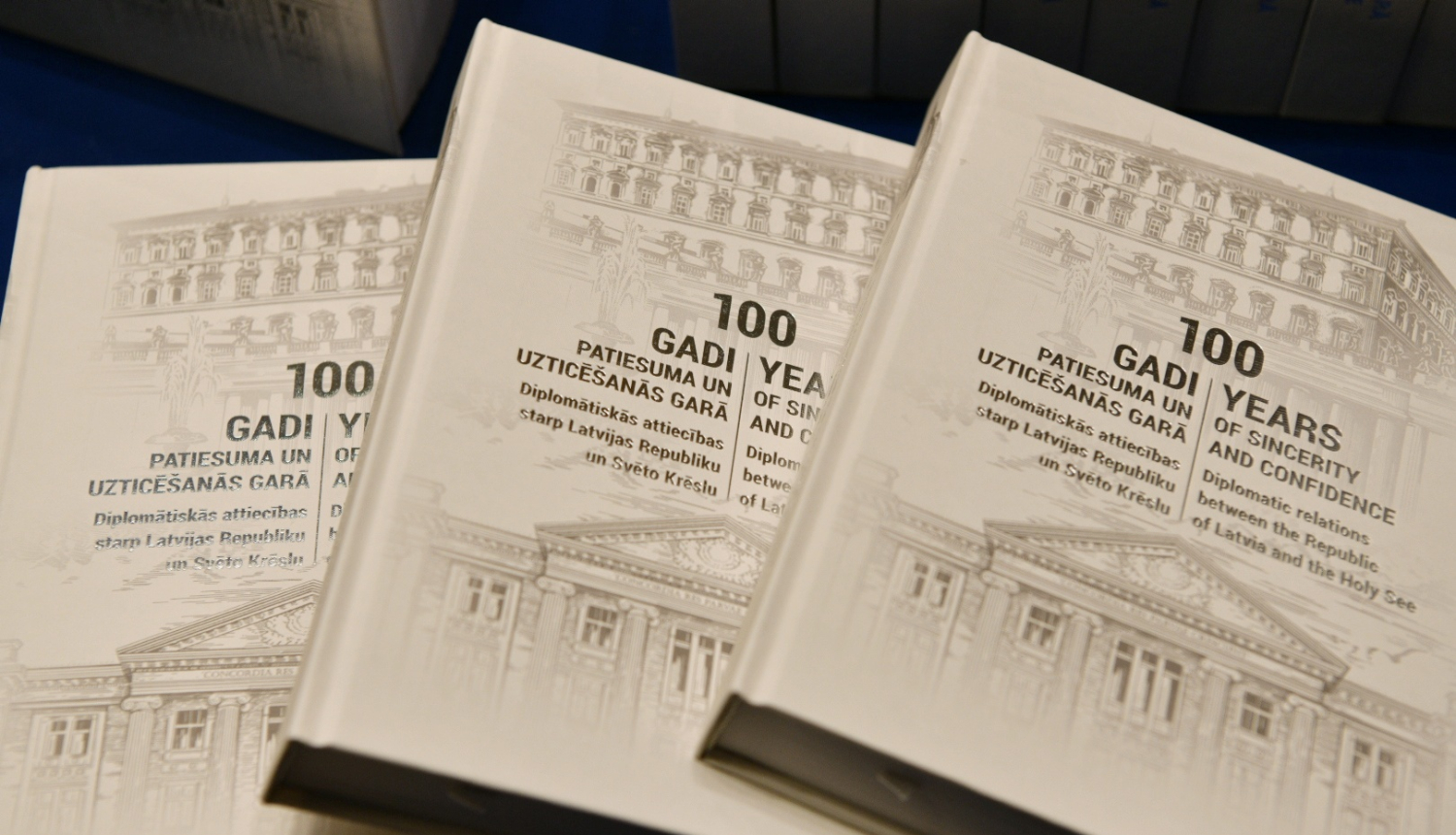On 10 May, ‘100 years of sincerity and confidence. Diplomatic relations between the Republic of Latvia and the Holy See’, a collection of articles and documents, was released at the LUMSA University (Rome) to mark 100 years of Holy See-Latvia relationship.
Due to President Levits’ participation in NATO Eastern Flank, or Bucharest Nine (B9), virtual summit, speech prepared by President for the launch ceremony was delivered Minister for Justice Jānis Bordāns.
In his speech, Egils Levits thanks the creative team behind the publication for compiling a very detailed account of Latvia-Holy See relations throughout major historical and political periods of the 20th century until today. Book consists of research conducted by priest Mihails Volohovs and Dr. hist. Inese Runce, as well as unpublished archive documents chronicling Latvia-Holy See relations between 1918 and 1958. Publication was financially supported by Ministry of Foreign Affairs of Latvia through its public diplomacy centenary programme in collaboration with Holy See’s Secretariat of State, Pontifical Committee for Historical Sciences and National Archives of Latvia.
Speech of President Levits looks back at the main milestones in the history of relations between Latvia and the Holy See, with policy of non-recognition of incorporation of Latvia into USSR as one of its highlights.
President also emphasises the enormous role played by the Catholic Church and Catholics in the formation of Latvian State in 1917 and 1918. Integration of predominantly Catholic Latgale into the new Latvian State was one of the main domestic priorities at the time.
‘Holy See refused to recognise the forceful incorporation of Latvia into the USSR in 1940 from the first day when the power was seized. In hindsight, we should feel grateful to Catholic Church for maintaining its bond with Latvian Catholics, who were forced to live behind the Iron Curtain or in exile, despite these turbulent times,’ underlines Egils Levits in his speech.
President Levits praises Bishop Boļeslavs Sloskāns who was viciously persecuted by the Soviet regime: ‘His beatification would be the highest praise of Bishop Sloskāns life-long spiritual pursuit of truth and service to others, his unshakeable faith and spirit that even totalitarian rule could not brake. Catholic community of Latvia, and Belarus, for which Boļeslavs Sloskāns became their Bishop for some time, would greatly appreciate such step’.
Egils Levits acknowledges the traditionally strong ecumenical spirit, religious diversity and freedom in Latvia. He also points out that Satversme, or the Constitution of Latvia, which will turn 100 years old next year, separates church from state. However, state has continued to support church, and both have constantly cooperated: ‘Ecumenical service is a tradition that accompanies every 18 November when we celebrate the founding of the Latvian State together with spiritual leaders of all churches in Latvia. Such living and breathing ecumenism is one of Latvia’s unique traits’.
President recalls the visit of Pope Francis to Latvia in 2018 and pays tribute to his current international influence: ‘Role of multilateralism is bound to increase as the world exits the global crisis caused by the pandemic. We welcome Fratelli Tutti, the Encyclical letter of the Holy Father Francis, which urges the UN to promote the rule of law instead of the law of force and give preference to multilateral agreements that protect weaker states. Latvia has always highly valued the spiritual benefits of ecumenical traditions. We truly admired and cheered for the Pope when he went on his historic visit to Iraq as ‘Pilgrim of Peace’ to show his concern for ecumenism and nations living in peace with one another.’
Speech mentions that Latvia is also one of the sates actively engaged in addressing global challenges like sustainability and socially responsible development, education policy aligned with future of Europe. We try to understand how digital transformation will affect society and desire to find the best legal framework for Europe to enable more rapid uptake of digital technologies emerging globally.
President acknowledges Pope Francis’ efforts to draw global attention to issues of climate change: ‘Latvia is a green country. However, we too must revisit how we consume energy, move around and eat. That is how we will restore the primordial harmony with nature that Pope Francis constantly urges us to strive for’.




